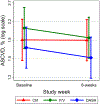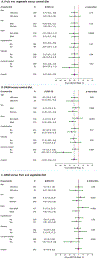Effects of Diet on 10-Year Atherosclerotic Cardiovascular Disease Risk (from the DASH Trial)
- PMID: 36459731
- PMCID: PMC10122756
- DOI: 10.1016/j.amjcard.2022.10.019
Effects of Diet on 10-Year Atherosclerotic Cardiovascular Disease Risk (from the DASH Trial)
Erratum in
-
Corrigendum to 'Effects of Diet on 10-Year Atherosclerotic Cardiovascular Disease Risk (from the DASH Trial)' [American Journal of Cardiology 187 (2023) 10-17].Am J Cardiol. 2024 Apr 1;216:112-113. doi: 10.1016/j.amjcard.2024.02.001. Epub 2024 Feb 12. Am J Cardiol. 2024. PMID: 38359896 No abstract available.
Abstract
Although modern risk estimators, such as the American College of Cardiology/American Heart Association Pooled Cohort Equation, play a central role in the decisions of patients to start pharmacologic therapy to prevent atherosclerotic cardiovascular disease (ASCVD), there is limited evidence to inform expectations for 10-year ASCVD risk reduction from established lifestyle interventions. Using data from the original DASH (Dietary Approaches to Stop Hypertension) trial, we determined the effects of adopting the DASH diet on 10-year ASCVD risk compared with adopting a control or a fruits and vegetables (F/V) diet. The DASH trial included 459 adults aged 22 to 75 years without CVD and not taking antihypertensive or diabetes mellitus medications, who were randomized to controlled feeding of a control diet, an F/V diet, or the DASH diet for 8 weeks. We determined 10-year ASCVD risk with the American College of Cardiology/American Heart Association Pooled Cohort Equation based on blood pressure and lipids measured before and after the 8-week intervention. Compared with the control diet, the DASH and F/V diets changed 10-year ASCVD risk by -10.3% (95% confidence interval [CI] -14.4 to -5.9) and -9.9% (95% CI -14.0 to -5.5) respectively; these effects were more pronounced in women and Black adults. There was no difference between the DASH and F/V diets (-0.4%, 95% CI -6.9 to 6.5). ASCVD reductions attributable to the difference in systolic blood pressure alone were -14.6% (-17.3 to -11.7) with the DASH diet and -7.9% (-10.9 to -4.8) with the F/V diet, a net relative advantage of 7.2% greater relative reduction from DASH compared with F/V. This was offset by the effects on high-density lipoprotein of the DASH diet, which increased 10-year ASCVD by 8.8% (5.5 to 12.3) compared with the more neutral effect of the F/V diet of -1.9% (-5.0 to 1.2). In conclusion, compared with a typical American diet, the DASH and F/V diets reduced 10-year ASCVD risk scores by about 10% over 8 weeks. These findings are informative for counseling patients on both choices of diet and expectations for 10-year ASCVD risk reduction.
Copyright © 2022 Elsevier Inc. All rights reserved.
Conflict of interest statement
Disclosures
The authors have no conflicts of interest to declare.
Figures


References
-
- Tsao CW, Aday AW, Almarzooq ZI, Alonso A, Beaton AZ, Bittencourt MS, Boehme AK, Buxton AE, Carson AP, Commodore-Mensah Y, Elkind MSV, Evenson KR, Eze-Nliam C, Ferguson JF, Generoso G, Ho JE, Kalani R, Khan SS, Kissela BM, Knutson KL, Levine DA, Lewis TT, Liu J, Loop MS, Ma J, Mussolino ME, Navaneethan SD, Perak AM, Poudel R, Rezk-Hanna M, Roth GA, Schroeder EB, Shah SH, Thacker EL, VanWagner LB, Virani SS, Voecks JH, Wang N-Y, Yaffe K, Martin SS. Heart Disease and Stroke Statistics-2022 Update: a report from the American Heart Association. Circulation 2022;145: e153–e639. - PubMed
-
- Lichtenstein AH, Appel LJ, Vadiveloo M, Hu FB, Kris-Etherton PM,Rebholz CM, Sacks FM, Thorndike AN, Van Horn L, Wylie-Rosett J. 2021 Dietary guidance to improve cardiovascular health: a scientific statement from the American Heart Association. Circulation 2021;144:e472–e487. - PubMed
-
- Anand SS, Hawkes C, de Souza RJ, Mente A, Dehghan M, Nugent R,Zulyniak MA, Weis T, Bernstein AM, Krauss RM, Kromhout D, Jenkins DJA, Malik V, Martinez-Gonzalez MA, Mozaffarian D, Yusuf S, Willett WC, Popkin BM. Food consumption and its impact on cardiovascular disease: importance of solutions focused on the globalized food system: a report from the workshop convened by the World Heart Federation. J Am Coll Cardiol 2015;66:1590–1614. - PMC - PubMed
-
- Arnett DK, Blumenthal RS, Albert MA, Buroker AB, Goldberger ZD,Hahn EJ, Himmelfarb CD, Khera A, Lloyd-Jones D, McEvoy JW, Michos ED, Miedema MD, Muñoz D, Jr Smith SC, Virani SS, Sr Williams KA, Yeboah J, Ziaeian B. 2019 ACC/AHA Guideline on the primary prevention of cardiovascular disease: a report of the American College of Cardiology/American Heart Association Task Force on Clinical Practice Guidelines. Circulation 2019;140:e596–e646. - PMC - PubMed
-
- Grundy SM, Stone NJ, Bailey AL, Beam C, Birtcher KK, Blumenthal RS, Braun LT, de Ferranti S, Faiella-Tommasino J, Forman DE, Goldberg R, Heidenreich PA, Hlatky MA, Jones DW, Lloyd-Jones D, Lopez-Pajares N, Ndumele CE, Orringer CE, Peralta CA, Saseen JJ, Smith SC, Sperling L, Virani SS, Yeboah J. AHA/ACC/AACVPR/AAPA/ABC/ACPM/ADA/AGS/APhA/ASPC/NLA/PCNA guideline on the management of blood cholesterol: a report of the American College of Cardiology/American Heart Association Task Force on Clinical Practice guidelines. Circulation 2019;139:e1082–e1143. - PMC - PubMed
Publication types
MeSH terms
Grants and funding
LinkOut - more resources
Full Text Sources
Medical

